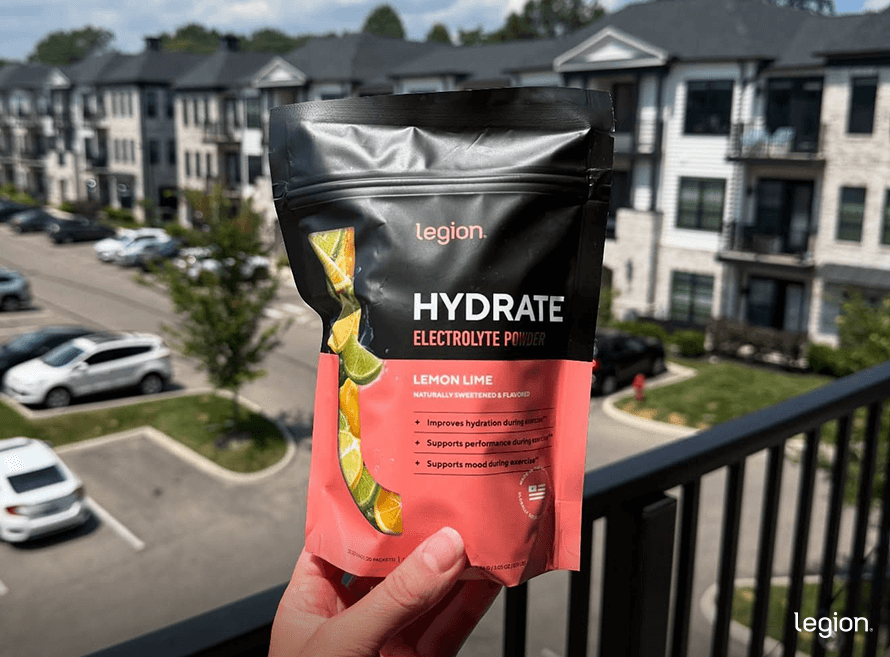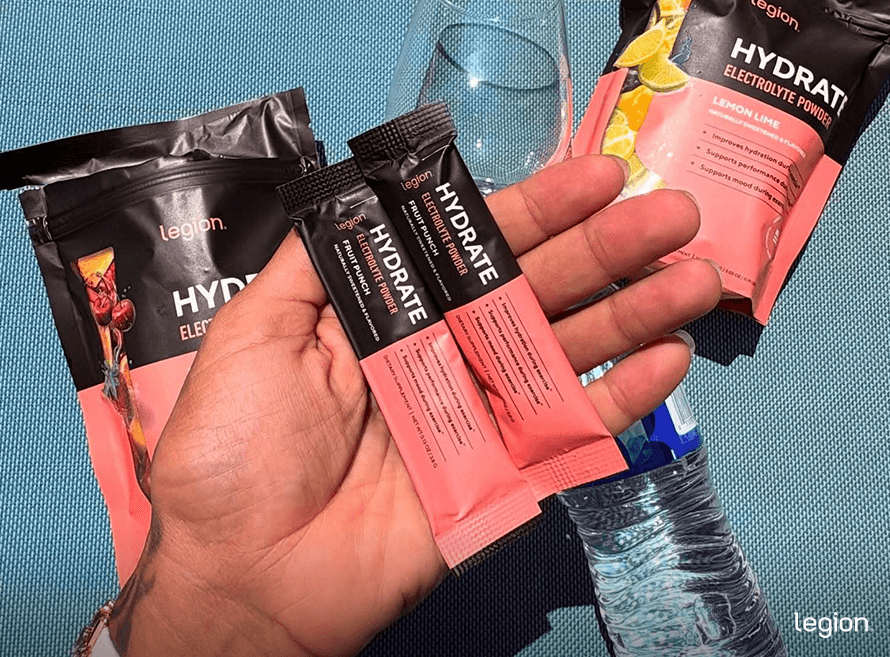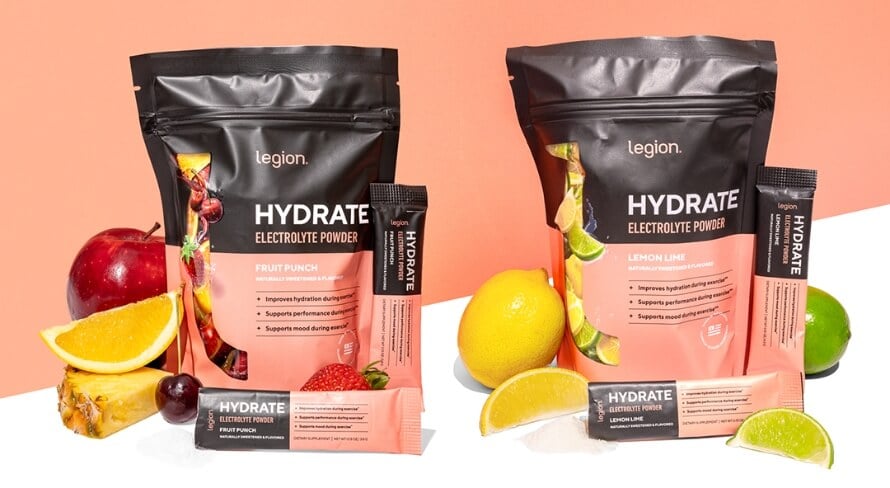Electrolyte supplements are everywhere now—lining store shelves, flooding your social feed, and forever in the hand of your favorite athlete.
Despite their ubiquity, most people aren’t sure what they actually do.
Some say they’re essential for anyone who exercises. Without them, fluid loss through sweat and urine depletes your body’s stores, leaving you chronically dehydrated and vulnerable to a range of problems.
Others argue they’re only useful if you do long, sweaty workouts. In those situations, they may help you train harder for longer and stay mentally sharper by keeping you better hydrated.
And plenty of people believe they’re utterly pointless because you simply don’t lose enough electrolytes to justify supplementation.
Who’s right? What do electrolyte supplements actually do? And when—if ever—are they worth taking?
Get evidence-based answers here.
Key Takeaways
- Electrolytes, such as sodium, potassium, and magnesium, are minerals that carry an electric charge when dissolved in water.
- They’re involved in many functions in the body, but some of their most important include supporting fluid balance, muscle function, and nerve signaling.
- Despite what supplement marketers claim, their main proven benefit is helping you retain more of the water you drink, which can improve hydration and, thus, performance.
- Most people don’t need electrolyte supplements, though—they’re only helpful during workouts where you sweat heavily (e.g. workouts of 45+ minutes in the heat).
- If you want a naturally sweetened and flavored electrolyte powder with clinically effective doses of sodium, potassium, and magnesium, and no added sugars, artificial sweeteners, or other unnecessary junk, try Hydrate.
Table of Contents
+
What Are Electrolytes?
Electrolytes are minerals that carry an electric charge when dissolved in water. In your body, they’re found in blood, inside your cells, and in the fluid between cells.
The main electrolytes are sodium (Na⁺), potassium (K⁺), magnesium (Mg²⁺), calcium (Ca²⁺), phosphate (PO₄³⁻), chloride (Cl⁻), and bicarbonate (HCO₃⁻).
What Do Electrolytes Do in the Body?

Electrolytes are essential for several core functions in your body. These include:
1. They Support Fluid Balance
The most important electrolytes for maintaining fluid balance are sodium, potassium, and chloride.
Sodium pulls water into the spaces around cells and into your bloodstream, while potassium draws it inside cells. Together, they keep fluid balanced on both sides of the cell membrane, supporting hydration and cellular function.
Chloride works alongside sodium in this process, helping to maintain the pull that shifts water into your bloodstream and tissues.
Without enough sodium, potassium, and chloride, you can drink plenty of water but still become dehydrated, because your body can’t absorb, distribute, or retain it efficiently.
2. They Support Muscle Function
Electrolytes—especially sodium, potassium, calcium, and magnesium—are essential for muscle contractions because they control the electrical signals that tell your muscles when to contract and relax.
Sodium and potassium create the signals that start a contraction, calcium triggers the proteins that make the muscle shorten, and magnesium helps those proteins relax.
When electrolyte levels fall too low or rise too high, your muscles can lose strength, coordination, and endurance.
3. They Support Nerve Signaling
Electrolytes like sodium, potassium, calcium, and chloride enable your nerves to send signals quickly and efficiently.
Sodium and potassium create the tiny voltage changes that carry signals along your nerves, calcium helps pass them between nerves, and chloride keeps the electrical environment inside nerve cells stable so they fire only when they should.
If electrolyte levels drift too low or too high, your nerves may misfire or slow down, affecting everything from reflexes to coordination and focus.
What Are Electrolyte Supplements?
Electrolyte supplements contain one or more of the electrolytes your body loses in sweat or urine—typically sodium, potassium, and magnesium. They’re designed to replace these quickly and conveniently, especially during or after exercise.
You can get them in powders, ready-to-drink bottles, tablets, capsules, or gels. Many also have flavorings to make your water taste better, and some combine electrolytes with carbs to give you extra fuel while you train.
What People Say Electrolyte Supplements Do for You

Marketers often warn that your body’s stores of electrolytes are quickly depleted during exercise, wrecking your performance and inviting a long list of dangers like brain fog, fatigue, cramps, weakness, heatstroke, and fainting.
The solution, they say, is to take electrolyte supplements (usually drinks or tablets) and you’ll perform better, feel sharper, and dodge dehydration altogether.
In reality, most of these claims are wildly overstated. So what do electrolyte supplements actually do?
What Electrolyte Supplements Actually Do for You
Electrolyte supplements—specifically those containing sodium—help your body hold onto more of the water you drink.
This can support hydration compared to drinking water alone, which can help you sustain physical performance better than when you’re dehydrated.
For example, in a study published in the Scandinavian Journal of Medicine & Science in Sports, triathletes who took electrolytes before and during a half-ironman finished about 26 minutes faster than those who didn’t—while also maintaining more body fluid.
In another study published in the same journal, cyclists tackling a punishing time-trial in the heat performed 7% better after drinking electrolytes than when they drank plain water.
And in another study published in the Journal of Applied Physiology, female cyclists who drank electrolytes before training in hot conditions were able to ride for 20 minutes longer than when they consumed the same amount of plain water.
The same mechanism may also support post-workout recovery. In a study published in the European Journal of Applied Physiology and Occupational Physiology, high-sodium drinks rehydrated cyclists more effectively than lower-sodium drinks after exercising in the heat.
And in a study published in the Journal of Occupational and Environmental Medicine, farmers working in hot, humid conditions retained more fluid, had lower levels of creatine kinase (a marker of muscle damage), and felt less weak when they drank an electrolyte drink compared to when they didn’t.
Hydration doesn’t only affect physical performance, either—it influences mental sharpness, too. Research shows that even mild dehydration can impair focus, slow reaction time, sour mood, and make exercise feel harder.
By helping you stay hydrated, however, electrolytes may help you perform better during tasks that demand precision, attention, and coordination—like playing sports or lifting heavy weights.
Given all this, you’d be forgiven for thinking everyone who exercises should use electrolyte supplements. But in reality, few people need them.
Here’s why . . .
Do You Need Electrolyte Supplements?
Most people don’t need an electrolyte supplement. In fact, the current weight of the scientific evidence shows that, for the majority, electrolytes offer little or no benefit beyond making water taste better.
That’s because most people don’t lose enough sweat while training for electrolyte supplements to make a difference.
Whether they’ll help you depends on factors like the type and length of exercise you do, where you train, how much you sweat, and your overall diet.
You’re most likely to benefit if you:
- Train in hot and/or humid conditions, especially if you’re not used to it
- Work out at higher intensities or for longer durations (45+ minutes)
- Wear heavy clothing or gear that makes you sweat more
- Naturally sweat a lot or lose a lot of salt in your sweat
- Eat very little sodium or potassium
In these situations, electrolytes can help you retain more of the fluid you drink, which may improve endurance, recovery, and how you feel during exercise.
But if you do short (<45 minutes) workouts in cool conditions, don’t sweat much, or already get plenty of sodium and potassium from your diet, electrolyte supplements probably won’t do more for you than water alone.
What Is the Best Electrolyte Supplement?

A good electrolyte supplement should . . .
- Contain a sufficient amount of sodium to improve hydration status
- Not contain any artificial sweeteners, dyes, fillers, or other unnecessary junk
- Not contain added sugars so that you can fit it into any diet
- Be third-party tested so that you can be confident it doesn’t contain any banned or dangerous substances
- Taste good so that you enjoy consuming it
And that’s exactly what you get with Hydrate.
It provides 575 milligrams of sodium per serving—enough to replace the sodium lost in about 0.7 liters of sweat, which is typical for 30–90 minutes of exercise. It also matches the concentration used in research showing benefits without pushing sodium intake too high.
In addition, it contains 115 milligrams of potassium per serving to maintain the same 5-to-1 sodium-to-potassium ratio found in sweat.
And on top of that, Hydrate contains 35 milligrams of magnesium—enough to replace typical losses during intense, prolonged exercise.
What’s more, Hydrate contains no artificial sweeteners, dyes, fillers, or other unnecessary junk, and it’s tested for purity and potency in an ISO 17025–accredited third-party lab and certified free from contaminants and banned substances.
In other words, if you want an electrolytes supplement that’s properly dosed, research-backed, and transparently made, try Hydrate.
FAQ #1: Do electrolytes give you energy?
They support hydration, which can improve endurance and reduce fatigue during long workouts in the heat—and that can make you feel more energized. But they don’t give you energy in the same way a pre-workout supplement or food does.
FAQ #2: Are electrolytes good for you?
Yes—if your electrolyte levels are low. Supplementing with electrolytes helps your body maintain fluid balance, which comes with a variety of benefits. If your levels are already normal, however, taking more won’t offer extra benefits.
FAQ #3: Can I drink electrolyte water every day?
Yes. Drinking electrolyte water daily is fine for most people, especially if you train hard, sweat a lot, or live in a hot climate. But if you already get enough electrolytes from food and don’t lose much in sweat, then you don’t need to drink electrolytes every day.
FAQ #4: When should I take electrolytes?
The best time to take electrolytes is before, during, or after long, intense workouts—especially if you’re training in the heat or sweating heavily.
FAQ #5: Which foods are high in electrolytes?
Some examples of electrolyte-rich foods include:
- Sodium and chloride: Table salt
- Potassium: Bananas, apricots, lentils, potatoes
- Magnesium: Nuts, seeds, leafy greens, legumes
- Calcium: Dairy, tofu, leafy greens
- Phosphate: Meat, fish, dairy, beans
Scientific References +
- Ernstmeyer, Kimberly, and Elizabeth Christman. “Fluids and Electrolytes.” National Library of Medicine, Chippewa Valley Technical College, 2021, www.ncbi.nlm.nih.gov/books/NBK591820/.
- “Water and Sodium Balance - Endocrine and Metabolic Disorders.” Merck Manuals Professional Edition, www.merckmanuals.com/professional/endocrine-and-metabolic-disorders/fluid-metabolism/water-and-sodium-balance. Accessed 30 Aug. 2020.
- Yu-Yahiro, Janet A. “Electrolytes and Their Relationship to Normal and Abnormal Muscle Function.” Orthopaedic Nursing, vol. 13, no. 5, Sept. 1994, pp. 38–40, pubmed.ncbi.nlm.nih.gov/7854827/, https://doi.org/10.1097/00006416-199409000-00008.
- Armstrong, Lawrence . “Rehydration during Endurance Exercise: Challenges, Research, Options, Methods.” Nutrients, vol. 13, no. 3, 9 Mar. 2021, p. 887, www.ncbi.nlm.nih.gov/pmc/articles/PMC8001428/, https://doi.org/10.3390/nu13030887.
- Racinais, S., et al. “Consensus Recommendations on Training and Competing in the Heat.” Scandinavian Journal of Medicine & Science in Sports, vol. 25, no. 1, 6 May 2015, pp. 6–19, https://doi.org/10.1111/sms.12467.
- Driscoll, Rachel, et al. “Mild Dehydration Impaired Intermittent Sprint Performance and Thermoregulation in Females.” Applied Physiology, Nutrition, and Metabolism, 11 May 2020, https://doi.org/10.1139/apnm-2020-0040. Accessed 17 July 2020.
- ARMSTRONG, LAWRENCE E., et al. “Influence of Diuretic-Induced Dehydration on Competitive Running Performance.” Medicine & Science in Sports & Exercise, vol. 17, no. 4, Aug. 1985, pp. 456–461, https://doi.org/10.1249/00005768-198508000-00009.
- Bardis, Costas N., et al. “Mild Dehydration and Cycling Performance during 5-Kilometer Hill Climbing.” Journal of Athletic Training, vol. 48, no. 6, Dec. 2013, pp. 741–747, www.ncbi.nlm.nih.gov/pmc/articles/PMC3867084/, https://doi.org/10.4085/1062-6050-48.5.01. Accessed 28 Feb. 2019.
- Del Coso, J., et al. “Effects of Oral Salt Supplementation on Physical Performance during a Half-Ironman: A Randomized Controlled Trial.” Scandinavian Journal of Medicine & Science in Sports, vol. 26, no. 2, 14 Feb. 2015, pp. 156–164, https://doi.org/10.1111/sms.12427.
- Hamouti, N., et al. “Ingestion of Sodium plus Water Improves Cardiovascular Function and Performance during Dehydrating Cycling in the Heat.” Scandinavian Journal of Medicine & Science in Sports, vol. 24, no. 3, 17 Dec. 2012, pp. 507–518, https://doi.org/10.1111/sms.12028. Accessed 12 Dec. 2019.
- Sims, Stacy T., et al. “Preexercise Sodium Loading Aids Fluid Balance and Endurance for Women Exercising in the Heat.” Journal of Applied Physiology, vol. 103, no. 2, Aug. 2007, pp. 534–541, https://doi.org/10.1152/japplphysiol.01203.2006. Accessed 24 Jan. 2021.
- Merson, Stuart J., et al. “Rehydration with Drinks Differing in Sodium Concentration and Recovery from Moderate Exercise-Induced Hypohydration in Man.” European Journal of Applied Physiology, vol. 103, no. 5, 8 May 2008, pp. 585–594, https://doi.org/10.1007/s00421-008-0748-0. Accessed 17 Apr. 2020.
- SHIRREFFS, SUSAN M., et al. “Post-Exercise Rehydration in Man: Effects of Volume Consumed and Drink Sodium Content.” Medicine & Science in Sports & Exercise, vol. 28, no. 10, Oct. 1996, pp. 1260–1271, https://doi.org/10.1097/00005768-199610000-00009.
- Maughan, R. J., and J. B. Leiper. “Sodium Intake and Post-Exercise Rehydration in Man.” European Journal of Applied Physiology and Occupational Physiology, vol. 71, no. 4, Sept. 1995, pp. 311–319, https://doi.org/10.1007/bf00240410.
- Krisher, Lyndsay, et al. “Electrolyte Beverage Intake to Promote Hydration and Maintain Kidney Function in Guatemalan Sugarcane Workers Laboring in Hot Conditions.” Journal of Occupational and Environmental Medicine, vol. 62, no. 12, 1 Dec. 2020, pp. e696–e703, www.ncbi.nlm.nih.gov/pmc/articles/PMC7720870/, https://doi.org/10.1097/JOM.0000000000002033. Accessed 5 Apr. 2021.
- Armstrong, Lawrence E, et al. “Mild Dehydration Affects Mood in Healthy Young Women.” The Journal of Nutrition, vol. 142, no. 2, 2012, pp. 382–8, www.ncbi.nlm.nih.gov/pubmed/22190027, https://doi.org/10.3945/jn.111.142000.
- Ganio, Matthew S, et al. “Mild Dehydration Impairs Cognitive Performance and Mood of Men.” The British Journal of Nutrition, vol. 106, no. 10, 7 June 2011, pp. 1535–43, www.ncbi.nlm.nih.gov/pubmed/21736786, https://doi.org/10.1017/S0007114511002005.
- WITTBRODT, MATTHEW T., and MELINDA MILLARD-STAFFORD. “Dehydration Impairs Cognitive Performance.” Medicine & Science in Sports & Exercise, vol. 50, no. 11, Nov. 2018, pp. 2360–2368, https://doi.org/10.1249/mss.0000000000001682.
- American College of Sports Medicine. “Exercise and Fluid Replacement.” Medicine & Science in Sports & Exercise, vol. 39, no. 2, Feb. 2007, pp. 377–390, https://doi.org/10.1249/mss.0b013e31802ca597.
- Research, Institute of Medicine (US) Committee on Military Nutrition, and Bernadette M. Marriott. The Effect of Exercise and Heat on Mineral Metabolism and Requirements. Www.ncbi.nlm.nih.gov, National Academies Press (US), 1993, www.ncbi.nlm.nih.gov/books/NBK236242/. Accessed 20 Apr. 2021.
- Cristiane Hermes Sales, and Lucia Fatima. “Magnesium and Diabetes Mellitus: Their Relation.” Clinical Nutrition, vol. 25, no. 4, 1 Aug. 2006, pp. 554–562, https://doi.org/10.1016/j.clnu.2006.03.003. Accessed 21 Apr. 2023.
- Baker, Lindsay B., et al. “Exercise Intensity Effects on Total Sweat Electrolyte Losses and Regional vs. Whole-Body Sweat [Na+], [Cl−], and [K+].” European Journal of Applied Physiology, vol. 119, no. 2, 6 Dec. 2018, pp. 361–375, https://doi.org/10.1007/s00421-018-4048-z.










